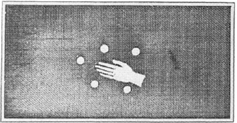
A Note on Sanskrit Pronunciation

The vowels are given their full value, as in Italian, with the exception of the short a, which is more like the u in but. Thus long ā is pronounced like the a in father, i as in fit, ī as in machine, u as in put, ū as in rule, e as in the Italian nero, o as in the Italian tenore, ai as i in bite, au as ou in found. R and  are also vowels and are generally pronounced as r followed by a very short i or u, somewhat like re in pretty, and as le in little, or in the French table.
are also vowels and are generally pronounced as r followed by a very short i or u, somewhat like re in pretty, and as le in little, or in the French table.
The aspiration of the aspirated consonants should be heard distinctly. Thus th and ph must never be pronounced as in English thin and telephone, but as in hothouse and upheaval. The same for kh, gh, ch, jh, ṭh, ḍh, dh, bh. G is sounded as in get, and ṇ as n in king; c is similar to ch in church, and j is pronounced as in join. Ñ sounds like n in punch, but the combination jñ may be pronounced somewhat like dny or gny. The difference between the retroflex ṭ, ṭh, ḍ, ḍh, ṇ and the dentals t, th, d, dh, n is that the former set is pronounced with the tongue turned rather back along the palate, while the latter is produced by bringing the tip of the tongue against the very edge of the front teeth. S sounds like s in sin, ṣ like sh in shun, while ś is something midway between the two.
H is in India generally pronounced as a hard h followed by a faint echo of the preceding vowel, while ṃ is a nasalization of the preceding vowel, rather in the way some French vowel sounds are nasalized. The stress is laid on a long penultimate (Kālid sa), on the antepenultimate when followed by a short syllable (Him
sa), on the antepenultimate when followed by a short syllable (Him laya, Gótama), and on the fourth from the end when two short syllables follow (k
laya, Gótama), and on the fourth from the end when two short syllables follow (k rayati). A syllable is long if it contains a long vowel (ā, ī, ū, e, o, but also ai and au), or a vowel followed by more than one consonant. It should be noted that the aspirated consonants are considered single consonants in the Sanskrit alphabet. In a few words which are typically Vedic the musical accent called udātta has been marked. This stress, which consisted in a higher pitch of the voice, has disappeared in Classical Sanskrit.
rayati). A syllable is long if it contains a long vowel (ā, ī, ū, e, o, but also ai and au), or a vowel followed by more than one consonant. It should be noted that the aspirated consonants are considered single consonants in the Sanskrit alphabet. In a few words which are typically Vedic the musical accent called udātta has been marked. This stress, which consisted in a higher pitch of the voice, has disappeared in Classical Sanskrit.